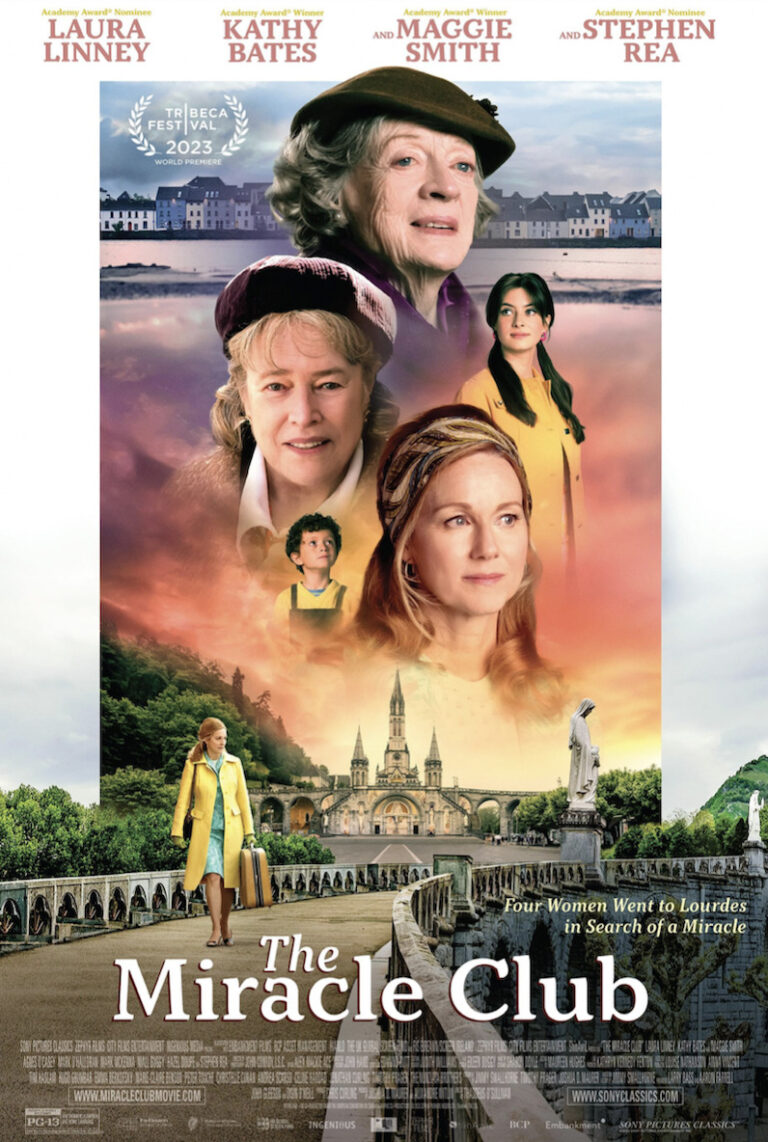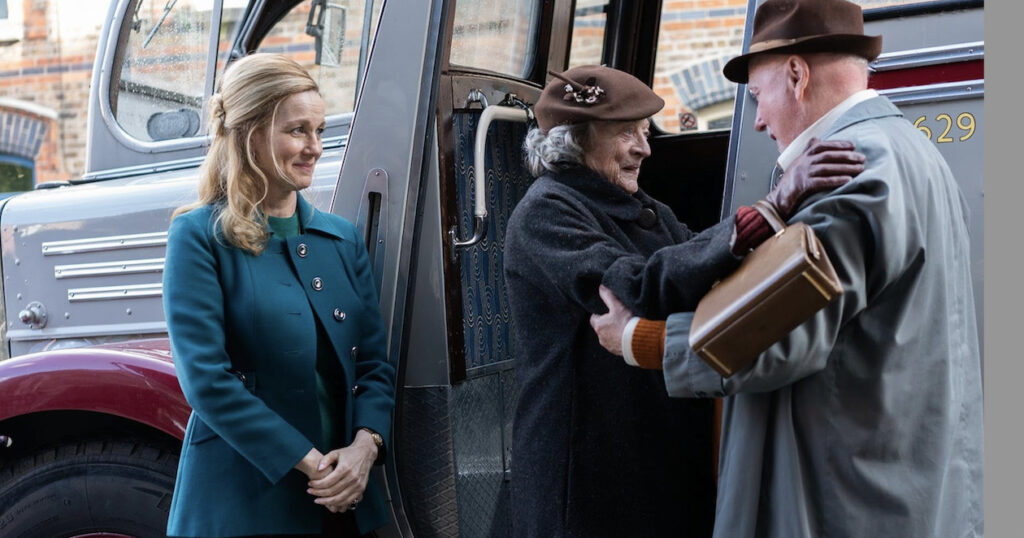
Ireland, as I am fond of saying, is an isle with forty shades of green and eighty shades of grudge. No other people but my own seem to have so perfected the art of carrying resentment through the generations, which is one of the premises of The Miracle Club, Thaddeus O’Sullivan’s terribly beautiful film, to borrow an allusion from William Butler Yeats.
With a cast that includes Maggie Smith, Laura Linney, Kathy Bates, and Agnes O’Casey, The Miracle Club is both heart-warming and heart-wrenching in its depiction of the journeys of four working-class Irish women to the shrine of Lourdes in France.
As an Irish American who went to Catholic school eons ago, I’ll admit to more than a little trepidation when I was assigned to review this tale of hard feelings dissolved in streams of mercy, with a little help from the magical waters of Lourdes. Given my upbringing, would I be able to look at this film with the proper degree of objectivity? After all, from my earliest years, I’d been taught that film critiques had to be based on a movie’s moral message, not its artistic merits.
In that long-ago nunly era, Irish Catholics tended to view movies with suspicion because they were allegedly sources of temptation, particularly of a sexual nature (or concupiscence, as it was described in Catholic lingo). As a pupil in Catholic school, I was required to tell the priest in confession whether I had violated my annual pledge to the Legion of Decency, a censorious fellowship that enjoined us to watch wholesome movies (ie, those marinated in the moral messaging described above).
As a result of these efforts, syrupy 1940s productions like Going My Way and The Bells of St. Mary’s were the ones that got the unofficial imprimatur of the church, as did The Song of Bernadette, a 1943 flick about the apparition of the Virgin Mary in Lourdes, France to a young peasant girl, played by Jennifer Jones.
The Miracle Club, which opened in theaters this week, is another film about Lourdes, but this one is neither syrupy nor sanctimonious. It is a deeply human tale about four women who confront and cast out their demons while on a pilgrimage to that storied shrine in the south of France. Set in Dublin in 1967, when the all-male priesthood and hierarchy still had its iron-fisted grip on Irish culture, The Miracle Club testifies to the resilience and resistance of strong-hearted women in reclaiming their lives.

Not to say their motivation for the journey was completely spiritual, at least as defined by “himself” (the pejorative pronoun the Irish typically used to describe the clergy). As we’ve known since the days of Chaucer, pilgrimages are fraught affairs, bringing together sojourners with vastly different stories and perspectives. This quartet’s “sister act” came to win their pilgrimage in a talent show at their parish church in a working-class neighborhood in Dublin. The four women of The Miracle Club seem as anxious to escape their bumbling and abusive husbands for a few days as to take the vapors of Lourdes.
As screenwriter Jimmy Smallhorne explains: “I wanted to take these women off the street and away from their roles of being mothers, and try and bring them to a place where they were individuals before they became married. I wanted them to go to the cradle of compassion for Catholicism, and for them to deal with their issues in a loving, supportive, nonjudgmental way.”
Each of the four women have been burdened by episodes of guilt, past and present. Chrissie, brilliantly portrayed by Laura Linney, has returned to the old ‘hood for her mother’s funeral after decades of exile in Boston as a “fallen woman.” Back in Dublin, she befriends the aging Lily (Maggie Smith) and Eileen (Kathy Bates), also brilliant and touching in their deft portrayals of elderly women trying to keep the faith at the close of their lives. They are joined by the twentysomething Dolly (Agnes O’Casey), the mother of a six-year-old Daniel (Eric D. Smith) who suffers from an autism-like syndrome that has rendered him a “dumb mute,” to use an unfortunate term from the old Catholic Ireland. Dolly blames this misfortune on her failed attempt to miscarry him.
During the course of their visit to Lourdes, the women share stories—another Chaucerian touch—that ultimately lead to redemptive self-forgiveness. Water is the universal solvent here: the waters of “mourning and weeping in this vale of tears”; the waters of Dublin harbor in which Chrissie’s lover Declan drowned, leaving her pregnant and disgraced; the waters in which Chrissie and Dolly immersed themselves hoping for a miscarriage.
All’s well that end well, as seen in the final scene when the women return to hearth and home, cleansed of their guilt by confessing not to a priest but to each other. Two of the most poignant moments in the film are fleeting, as when Chrissie clasps Lily’s hand as they make their way to the site of Declan’s drowning, and when Dan, obsessed with a snow globe he found in a Lourdes gift shop, finally utters his first word: “home.”
With all due respects to the Legion of Decency, this is more than a decent film: It is extraordinarily powerful in its affirmation of the miraculous in lives scarred by self-loathing and skepticism. It has none of the syrupy sentimentality of the “Catholic” films of my childhood. In fact, it makes me full-circle back to Yeats again, who famously wrote in one of his Crazy Jane poems: “a woman can be proud and stiff/when on love intent/but love has pitched his mansion in/the place of excrement.”
Grade : A+
Check out more of Edward’s articles.
Here’s the trailer of the film.

